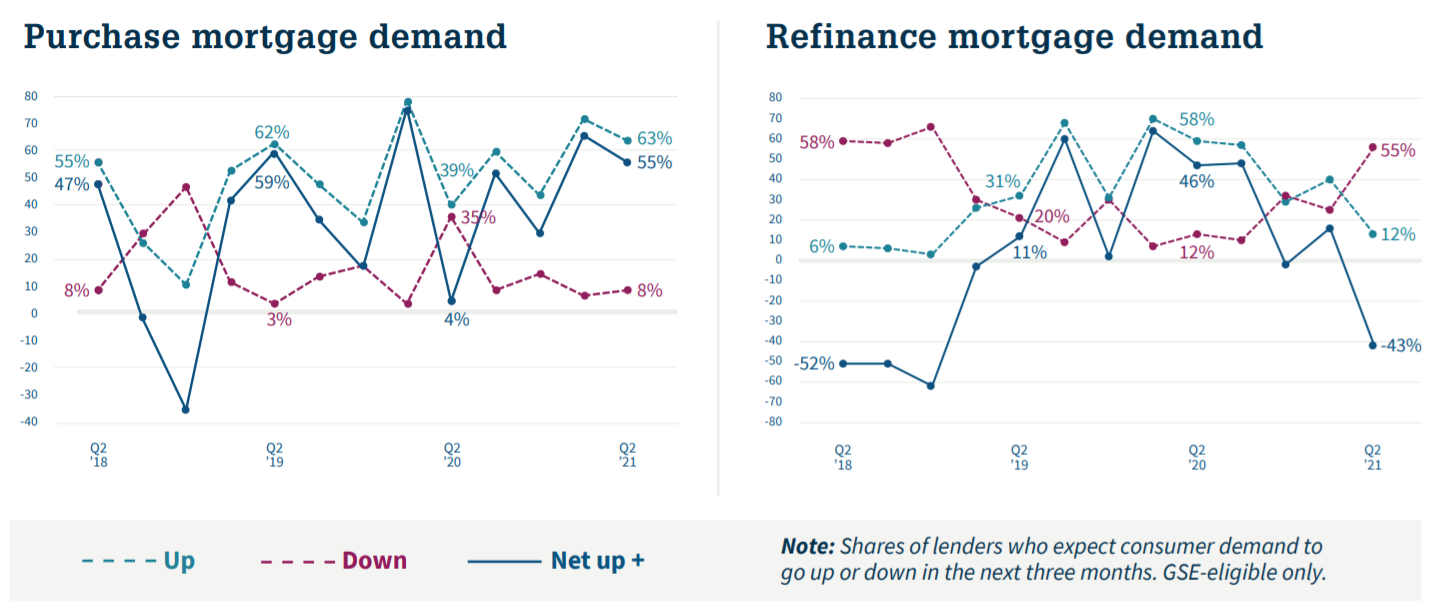 Fannie Mae’s Q2 2021 Mortgage Lender Sentiment Survey (MLSS) has found that, for the third consecutive quarter, an increased share of mortgage lenders expect profit margins to retreat further from last year's highs. According to the second quarter survey, 69% of lenders believe profit margins will decrease in the three months ahead compared to 52% in the prior quarter, while 19% believe profits will remain the same and 11% believe profits will increase.
Fannie Mae’s Q2 2021 Mortgage Lender Sentiment Survey (MLSS) has found that, for the third consecutive quarter, an increased share of mortgage lenders expect profit margins to retreat further from last year's highs. According to the second quarter survey, 69% of lenders believe profit margins will decrease in the three months ahead compared to 52% in the prior quarter, while 19% believe profits will remain the same and 11% believe profits will increase.
In reviewing consumer demand over Q2, across all loan types, more lenders reported increased demand for purchase mortgages, but significantly reduced refinance mortgage demand. For refis, the net share of lenders reporting demand growth over the prior three months turned net negative for the first time since the first quarter of 2019, and reached the lowest reading since Q4 of 2018 for GSE-eligible and government loans. Lenders’ expectations for purchase demand growth over the next three months remain relatively strong, but are down slightly from last quarter for GSE-eligible and government loans, while refinance demand expectations fell significantly across all loan types.
"Despite elevated optimism toward the U.S. economy, lenders show a cautious outlook for their mortgage business," said Doug Duncan, Fannie Mae SVP and Chief Economist. "This quarter, the largest net percentage of lenders in the survey’s seven-year history are expecting a decrease in their profit margin outlook. This is the third quarterly decline from the lender profitability highs of 2020. Those who expected a lower profit margin continued to cite competition from other lenders and market trend changes as the primary reasons. Lenders reported a significant refinance demand decline over the past three months and expect the decline to continue, with their refinance demand growth expectations reaching the lowest level seen since Q4 2018. With the shift from refinance to purchase business, some lenders commented that purchase transactions are harder to complete and have lower margins."

For purchase mortgages, the net share of lenders reporting demand growth over the past three months increased from last quarter across all lender types. Looking ahead, lenders’ demand growth expectations over the next three months are slightly down for GSE-eligible and government loans and about even for non-GSE-eligible loans. For refis, the net share of lenders reporting demand growth over the prior three months dropped from the last quarter across all loan types, turning net negative for the first time since Q1 of 2019, and reaching the lowest reading since Q4 of 2018 for GSE-eligible and government loans. Refinance demand growth expectations on net for the next three months also fell significantly across loan types, reaching the lowest levels seen since Q4 of 2018.
And as the nation’s housing supply continues to grow increasingly restricted, rates continue to slide; however, both purchase apps and refis have also experienced a decline.
"Recent economic indicators, however, paint a somewhat more positive picture," said Duncan. "Though the primary-secondary mortgage spread has continued to narrow, it remains wider than the level seen pre-pandemic, suggesting that lenders are still making profits, though not as much as they did in 2020. Purchase mortgage applications have trended slightly lower in recent weeks; however, they remain fairly strong, and higher than the pre-pandemic level, likely because of continued low mortgage rates. Our June National Housing Survey released early this week showed that consumer demand remains strong since ‘home purchase on next move' is at a survey high, despite the challenges of accelerated home price appreciation and insufficient supply."
Click here to read more on Fannie Mae’s Q2 2021 Mortgage Lender Sentiment Survey.

 theMReport.com Your trusted source for mortgage banking news
theMReport.com Your trusted source for mortgage banking news








